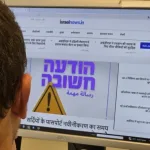Jerusalem, 25 November, 2025 (TPS-IL) — As countries around the world mark the International Day for the Elimination of Violence against Women on Tuesday, Israel has rolled out a new digital interface designed to help prevent gender-based killings by closing long-criticized gaps between government agencies. Officials say the system, which connects the Firearms Licensing Division of the Ministry of National Security with the Ministry of Welfare and Social Security, could become a critical early-warning mechanism for women at risk.
The database allows welfare authorities — for the first time — to receive real-time information not only about Israelis who already possess firearms licenses, but also about those applying for them. Social workers will now be authorized to flag an applicant if there is credible concern for human life or risk, and the licensing officer must immediately pass this information to the Welfare Ministry for urgent assessment. The reform was made possible by a recent amendment to Israel’s Firearms Law that passed its final Knesset readings earlier this year.
The move is part of a broader push by National Security Minister Itamar Ben-Gvir to expand inter-agency cooperation amid a significant increase in firearm availability since Hamas’ October 7, 2023 attack on southern Israeli communities. In the aftermath of the attack, the Firearms Licensing Division received an unprecedented 400,000 applications for permits.
Ahead of the International Day for the Elimination of Violence against Women, the Israel Women’s Network (IWN) reported a stark rise in femicide over the past two years. According to the organization, 34 women have been murdered on gender grounds so far in 2025 — an average of one killing every nine days and a 48% increase from the same period last year. Half of the victims were killed with firearms, more than double the rate from just three years ago.
In an interview with The Press Service of Israel, IWN CEO Tal Hochberg said the state’s failure to maintain a centralized, transparent archive of femicide has forced civil society to fill the gap. “We have been doing archival tracking of femicide for over four years because the state does not, and we have entered the vacuum,” she said. “It is important to know how to be based on data, so the archive helps us understand the needs.”
Hochberg said two years of being on a war footing has deepened existing risks. “More have been murdered since the beginning of the war. The murder of women with firearms has experienced a large increase. Since the beginning of the war, 43% of the cases have been with firearms. This is noticeable in Jewish and Arab society, and it is not surprising in light of the extreme increase in the appearance of firearms.”
She noted that the availability of weapons surged following emergency regulatory easing after the October 7 attacks. IWN has since lobbied intensively for exactly the kind of mechanism the government has now introduced. “An application to receive a weapon requires a doctor’s approval and approval from the police — but no one checks with the Ministry of Social Affairs,” she said, explaining that many documented cases of violent men never appear in police records but are well known to welfare services.
Hochberg also highlighted severe disparities in law-enforcement outcomes. “Ninety-five percent of the murder cases of Jewish women have been solved, compared to 7% of the murders of Arab women,” she said, calling the gap “the main failure” in the national response to gender-based violence.
Beyond the new database, Hochberg urged the government to raise public awareness of Israel’s technological supervision law, which enables courts to place GPS-enabled ankle bracelets on violent partners. “The problem is that no one knows about it — women don’t know they can request it, lawyers don’t know about it, and judges don’t know to carry it out,” she said.
Asked what women in abusive relationships should do, Hochberg stressed one message above all: “Do not separate alone. Many murders occur when the woman tries to separate from her partner.” She stressed the importance of calling a local hotline because “It is not a simple process to escape from a violent relationship, but it is possible.”
Israeli citizens do not have a legal right to privately carry firearms, and the country has strict gun control laws.
Applicants must meet minimum age requirements, have no criminal record, and provide a declaration signed by a doctor certifying that they are physically and mentally healthy. They must also explain to the Firearms Licensing Division why they need to carry a gun. Permission is not automatic, and the type of gun an Israeli is permitted to carry may depend on the reason given to the authorities. Licenses must be renewed every three years.






























